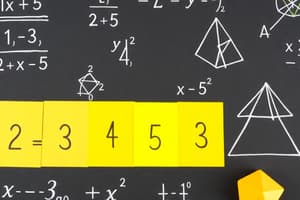Podcast
Questions and Answers
What is the primary focus of arithmetic?
What is the primary focus of arithmetic?
- Fundamental operations on numbers (correct)
- Understanding complex functions
- The study of space and figures
- Collecting and analyzing data
Which mathematical branch involves the use of symbols to represent unknown quantities?
Which mathematical branch involves the use of symbols to represent unknown quantities?
- Calculus
- Geometry
- Statistics
- Algebra (correct)
What are two key concepts in geometry?
What are two key concepts in geometry?
- Derivatives and integrals
- Similarity and transformations (correct)
- Congruence and velocity
- Functions and inequalities
What is the primary purpose of differentiation in calculus?
What is the primary purpose of differentiation in calculus?
Which branch of mathematics involves calculating areas and volumes of shapes?
Which branch of mathematics involves calculating areas and volumes of shapes?
What fundamental property of numbers indicates that the order of addition does not affect the outcome?
What fundamental property of numbers indicates that the order of addition does not affect the outcome?
In statistics, what is the primary focus regarding data?
In statistics, what is the primary focus regarding data?
Which of the following techniques is fundamental for integration in calculus?
Which of the following techniques is fundamental for integration in calculus?
Flashcards
Algebra
Algebra
A branch of mathematics that uses symbols (variables) to represent unknown quantities and relationships between them.
Arithmetic
Arithmetic
The fundamental operations on numbers: addition, subtraction, multiplication, and division.
Geometry
Geometry
The study of shapes, sizes, and properties of space figures, including points, lines, angles, triangles, and circles.
Mathematics
Mathematics
Signup and view all the flashcards
Calculus
Calculus
Signup and view all the flashcards
Statistics
Statistics
Signup and view all the flashcards
Axioms & Postulates
Axioms & Postulates
Signup and view all the flashcards
Problem Solving
Problem Solving
Signup and view all the flashcards
Study Notes
Fundamental Concepts
- Mathematics is a system of logic and reasoning used to quantify, measure, and describe the world around us.
- It encompasses various branches, including arithmetic, algebra, geometry, calculus, and statistics.
- Key skills include problem-solving, critical thinking, and analytical reasoning.
- Mathematical concepts are often abstract and involve symbols, equations, and figures.
- Mathematical theories are built on axioms and postulates.
Arithmetic
- Arithmetic deals with fundamental operations on numbers: addition, subtraction, multiplication, and division.
- It forms the foundation of all other branches of mathematics.
- Properties of numbers, such as commutativity, associativity, and distributivity, are essential concepts.
- Understanding place value and significant figures are fundamental.
- Techniques like prime factorization and greatest common divisors are useful for problem-solving.
Algebra
- Algebra uses symbols (variables) to represent unknown quantities and relationships between them.
- It extends arithmetic by introducing equations and inequalities.
- Properties of equality and inequality allow for manipulation and solution of unknown quantities.
- Solving for variables is a key skill.
- Factoring, expanding, and simplifying algebraic expressions are crucial.
- Understanding functions and graphs is a pivotal aspect
Geometry
- Geometry deals with shapes, sizes, and properties of space figures.
- Basic shapes include points, lines, angles, triangles, quadrilaterals, and circles.
- Two-dimensional (2D) geometry involves shapes on a plane, while three-dimensional (3D) geometry entails solids in space.
- Concepts like congruence, similarity, and transformations are essential.
- Geometric proofs and theorems are used to establish relationships.
- Calculating areas and volumes of geometric shapes is important.
Calculus
- Calculus deals with continuous change and motion using limits and derivatives.
- Differentiation finds rates of change, while integration finds accumulated quantities.
- Applications include optimization problems, motion analysis, and curve sketching.
- Understanding limits is essential for calculus.
- Techniques like substitution and integration by parts are fundamental.
- Applications of calculus are ubiquitous in science and engineering.
Statistics
- Statistics collects, analyzes, interprets, and presents data.
- It deals with measuring central tendencies (mean, median, mode), variability (range, standard deviation), and distributions of data.
- Using statistical graphs and charts are helpful in visualizing data.
- Probability plays a critical role in statistical analysis.
- Concepts of hypothesis testing are essential.
- Statistical inference aims to draw conclusions from data.
Studying That Suits You
Use AI to generate personalized quizzes and flashcards to suit your learning preferences.




